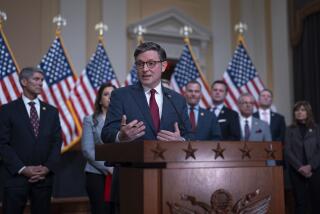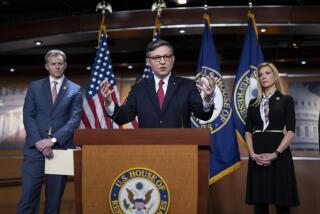House approves debt limit legislation with no strings attached
WASHINGTON - The U.S. House of Representatives approved legislation Tuesday to extend the nation’s borrowing capacity for another year, all but ensuring that Congress’ recent fiscal cease-fire extends through the summer.
Republican leaders brought the measure quickly to the floor after the fractious majority failed to agree on what, if any, provisions to attach to the must-pass legislation. The chamber’s Democratic minority provided most of the votes needed to approve the measure, with only 28 Republicans voting on the so-called clean debt limit measure. The final vote was 221 to 201.
As late as Monday evening, party leaders were seeking to build support for tying a debt-limit increase to a proposal to reverse a cut made to some veterans’ benefits as part of the recent budget deal. But it was soon clear that Republicans could not pass such a plan on their own, leading House Speaker John A. Boehner (R-Ohio) to announce Tuesday morning that he was moving the debt-limit measure without any strings attached.
“When you don’t have 218 votes, you have nothing,” Boehner told reporters.
Boehner also sought to put the onus on Democrats to advance the measure since President Obama was unwilling to negotiate with the GOP.
“Let his party give him the debt ceiling increase that he wants,” Boehner said.
But Rep. Steny H. Hoyer (D-Md.), the No. 2 House Democrat, said it was “pathetic” for Republicans to attempt to demagogue on the issue, and linked it to Boehner’s recent acknowledgment that passing immigration reform legislation was unlikely this year.
“The debt limit shows [and] comprehensive immigration reform shows that the Republican Party is a deeply divided party whose leaders have great difficulty of finding followers, and who are out of sync with the American people,” he told reporters. “That is a party that is rudderless and should be rejected by the American people.”
The Senate could sign off on the debt-limit measure as soon as Wednesday, sending it to President Obama well ahead of the Feb. 27 deadline that Treasury Secretary Jacob J. Lew had set as the date the nation risked default.
Congress’ next fiscal deadline now is not until the fall, when it must pass another round of appropriations bills to fund the government beyond Sept. 30. Few expect, however, that lawmakers will risk a government shutdown so close to the midterm elections in November.
Vice President Joe Biden, at the Capitol on Tuesday to swear in a new senator, signaled the White House’s own relief at moving beyond the fiscal battle.
“We’re now moving in a sort of regular order,” he said. “That’s how it’s supposed to work. I’m looking forward to them actually bringing it up and us moving on. We’ve got a lot to do.”
michael.memoli@latimes.com
Twitter: @mikememoli
More to Read
Get the L.A. Times Politics newsletter
Deeply reported insights into legislation, politics and policy from Sacramento, Washington and beyond. In your inbox three times per week.
You may occasionally receive promotional content from the Los Angeles Times.







